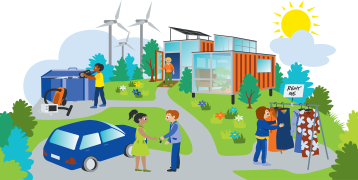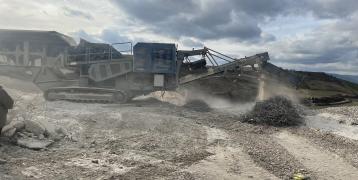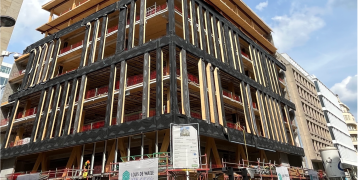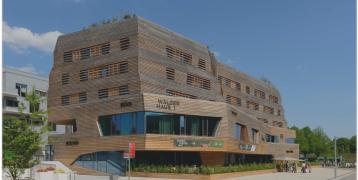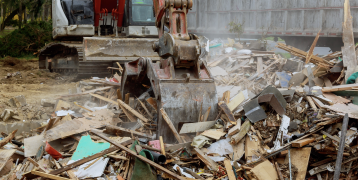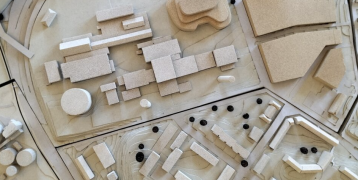Sustainability in construction: key learnings
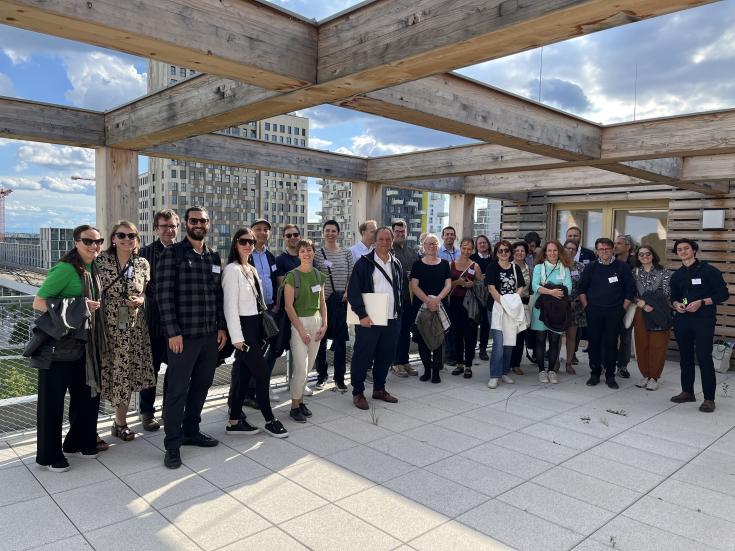
On 22 May 2024, the Policy Learning Platform organised a workshop on 'Promoting sustainable materials and circularity in construction' in Vienna. Throughout the day, we explored biobased materials for construction and circularity in construction.
What was the workshop about?
The construction industry is a major energy and raw materials consumer, responsible for almost 40% of emissions and nearly a third of all waste in the EU. Only about 40% of construction waste is recycled, often for lower-grade uses.
A circular approach—using recycled materials, designing for reuse, and maintaining buildings longer—offers environmental, social, and economic benefits. The EU's Circular Economy Action Plan and Waste Framework Directive highlight the sector's potential for circularity.
Local authorities can drive change through green procurement, pilot projects, awareness campaigns, and stakeholder collaboration.
During the day:
- An introduction of 'The Austrian policy framework for circularity in construction’ was delivered.
- The first thematic session keynote speech covered regional public procurement and policy measures for sustainable construction. Presentations included accelerating the adoption of bio-based raw materials in construction, the bioeconomy and circular economy in the wood sector, and insights on circular economy and sustainable construction developments.
- The second session keynote speech covered the Green Deal Circular Construction. Presentations included building with urban mining, a reuse center for building materialsr, stimulating demand for circular construction skills, and the DECORATOR project on circular transformation in architecture and construction.
- Two interactive World Café Sessions allowed participants to discuss and address challenges from the insights shared in a plenary session.
- It also included a site visit to a Timber construction ‘Forum am Seebogen’.
To learn more about this topic, explore the conclusions report our experts have prepared for you.
It contains insights into the promotion of sustainable materials and the circularity in construction as well as inspiring Interreg Europe good practices and policy recommendations.
Featured projects
Featured good practices
Discover the good practices from Interreg Europe projects that we explored during the workshop.
Biobased materials for construction
The Regional Government of Valencia has developed the Green Guide on public procurement environmental measures in the building sector to boost innovation and circular economy. The guide facilitates the tendering and contracting of construction works, as well as the harmonisation in the sector.
It aims at unifying technical and economic references, quality control, environmental and technological criteria. Moreover, it enables the optimisation of the resources used, reduces execution times, avoids confusion, conflicts, delays, and cost overruns in procedures.
The Building Balance programme aims at creating demand for biobased materials in the construction industry and among its clients. It actively helps processors to scale up, certify and connect them to customers in the construction industry and growers of the raw materials.
In addition, it also contributes to creating the right market conditions to increase the chances of acceleration and upscaling. Building Balance measures its success by a rapid increase in biobased material use in the construction industry, delivered by satisfied entrepreneurs throughout the chain.
The Styrian wood cluster is supporting companies in the forest-based sector through an interdisciplinary team of architects, engineers, innovation managers and communication experts. It brings together 170 partners including SMEs, manufacturing companies and research institutions.
The cluster supports innovation projects, networking and international cooperation, facilitates entering new markets and provides up-to-date information about the wood value chain. To make a valuable contribution to a successful future of the wood value chain, the cluster has formulated the Wood Cluster 2025+ strategy as an inspiration and agenda for the Styrian forest-based sector.
The Hanseatic City of Hamburg has many interesting initiatives to support more circular construction in the city. Over the years, Hamburg’s HafenCity has become a test bed for sustainable building. From a timber-built high-rise to the zero-emission house (completely carbon neutral and dismantlable), many forward-looking projects are bringing new methods and materials into construction practice, thus generating important impetus to the real estate sector. An interesting example is the HafenCity Ecolabel, which has been launched in 2007 as Germany’s first green building certification system.
Circularity in construction
Green Deals in Flanders are innovative green cooperation projects on various topics. By taking part in such a deal, one enters into a voluntary agreement with the Flemish government. The aim is to undertake sustainable actions and learn from other organizations. The Green Deal on Circular construction mobilised more than 370 organisations to work together to embed circular construction as common practice in Flanders. Together they raised awareness about the benefits of circular practices and developed a number of pilot projects.
The Danish Recycon company produces concrete with 100% recycled concrete aggregates and ordinary cement. The carbon footprint of such product is half of regular concrete. The company is making use of all leftover materials from construction and renovation. They process different fractions of building materials, such as bricks, tiles and sanitary ware into new aggregate materials. Use of recycled materials is significantly reducing the pressure on virgin materials and thus reducing an environmental impact of the construction industry.
Building materials have no tradition to get reused. However, in the Swedish Municipality of Lessebo a reuse centre for building materials has been created to show that it is possible to create a secondhand market for the materials. Individuals and enterprises leave their building materials at the reuse stations and customers buy the materials with doors and windows being the most popular items for reuse. The reuse centre is run by unemployed people in a labor market project and besides the environmental success, it has also proven to be socially sustainable.
The overall aim of BUS-GoCircular was to address and overcome the challenges of the stimulation of demand for green skilled workforce, along with hands-on capacity building to increase the number of skilled workforce across the value chain. The project developed and implemented a circular construction skills qualification framework with a focus on multifunctional green roofs, façades and interior elements. A large number of materials for policymakers and practitioners were developed, including training materials for trainers, training materials for public procurers, a guide for public authorities on stimulating demand for circular construction skills and many more.
The project is aspiring to catalyse the circular transformation of the built environment in the Danube Region by conceiving the region as a real life-laboratory. The project ties in with the New European Bauhaus initiative pursuing circularity and the transitioning towards a sustainable future as an aesthetic rather than exclusively technological project. At its heart, DECORATOR is a strategic policy development and explorative and piloting project. It develops and tests a new model of collaboration and intervention structured around the cradle-to-cradle approach.
Presentations
For more information on the good practices, download the presentations bellow.
